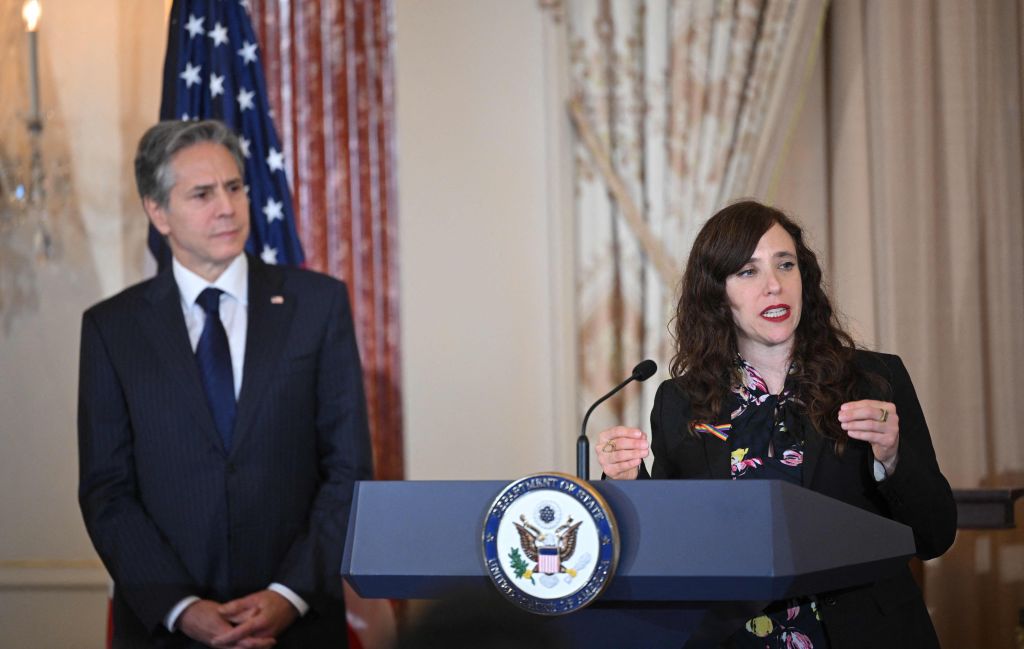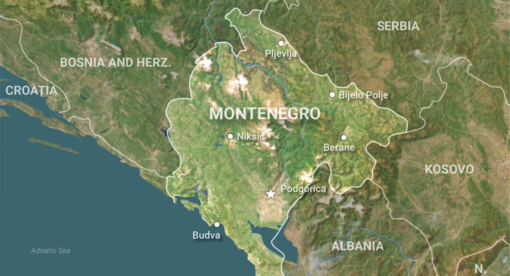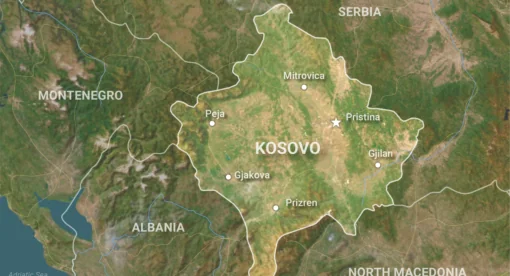With illiberal and populist mobilizations on the rise at home and abroad, LGBTQ+ (lesbian, gay, bisexual, transgender, and queer) rights are continually coming under attack in the media, in legislative initiatives, and on the campaign trail. A key strategy for both domestic and transnational illiberal and populist movements has been to denounce LGBTQ+ equality to rally support and build their base. As anti-LGBTQ+ sentiment spreads, LGBTQ+ people’s fundamental right to peace and security is being threatened. The decades of organizing for attention to gender as a dimension of foreign and domestic policy globally through the Women, Peace, and Security (WPS) agenda provide a valuable platform for addressing this growing issue in the lives of lesbian, bisexual, transgender and queer women.
In October, President Joe Biden’s administration recommitted to the WPS agenda with the release of the 2023 Women, Peace, and Security Strategy (WPS) and National Action Plan. Building on previous commitments to the WPS agenda, the administration also introduced new commitments to institutionalizing the agenda across U.S. policies and programs as well as new commitments to strengthen partnerships. Although there is very little in the way of commitments led by civil society, and none that focus specifically on partnerships with LGBTQ+ organizations, these two commitments do present opportunities for responding to the growing anti-LGBTQ+ violence in the United States.
The aim of U.N. Security Resolution 1325 and the now 10 U.N. Security Council resolutions that inform what is now known as the WPS agenda is to ensure that women are involved at all levels of decision making in peace and security practice and to ensure that a gender perspective is applied to all peace and security policies. Although much focus of the agenda to date has been primarily on cisgender women, there is a growing recognition that a gender perspective should also include attention to sexual orientation and gender identity and the lives of LGBTQ+ communities. As Biden stated in July 2021, the “persistent unequal treatment of women around the world – particularly women of color, LGBTQ+ women, and other women who face overlapping forms of discrimination – remains a critical, unfinished project of our time.” Recognizing the relationship between sexuality and gender identity in both contexts of peace and conflict is fundamental to notions of human rights.
This process, therefore, presents a window of opportunity for the Biden administration to directly address the growing threats against LGBTQ+ communities, including but not limited to homophobia, lesbophobia, biphobia, and transphobia as it impacts the lives of lesbian, bisexual, queer, and transgender women by promoting alliance building, data collection of LGBTQ+ lived experiences, and providing direct support for existing and emerging efforts that specifically support LGBTQ+ equality.
Expanding upon existing ideas around gender equality to include LGBTQ+ rights is not new. In March 2023, the U.N. Security Council held an Arria-formula meeting to discuss targeted violence and human rights abuses of LGBTQ+ people in Afghanistan and Colombia. During the meeting, two civil society representatives pushed for consideration of how to practically expand the U.N.’s WPS agenda to promote cross-cutting intersectional identities, including those related to sexual orientation, gender identity, and gender expression.
This call for greater visibility of LGBTQ+ people, including lesbian, bisexual, transgender and queer women, in the WPS agenda, however, comes at a time when illiberal groups are promoting policies to roll back or thwart gender and LGBTQ+ rights globally. Thus, to understand the state of insecurity of LGBTQ+ people today – and the need for greater inclusion in the WPS agenda – we must also grapple with the global resurgence of illiberal and populist politics, which are proving hostile to women’s and LGBTQ+ rights.
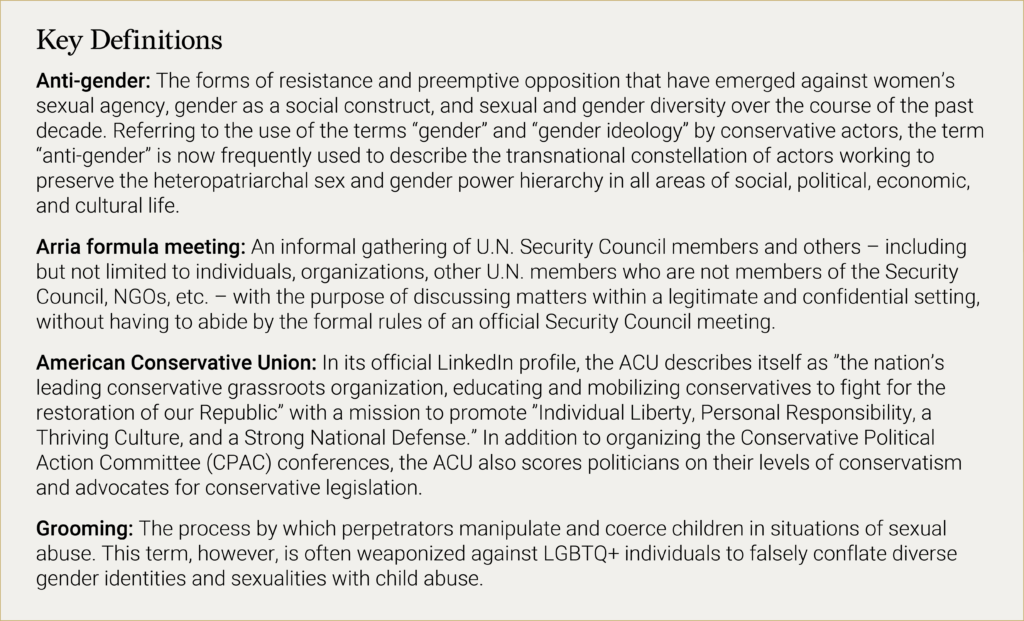
Illiberal and Populist Politics: At Home and Abroad
The populist and illiberal leaders of today are regularly espousing nationalist agendas and vilifying international cooperation as a treat to domestic interests. While in office between 2016 and 2020, President Donald Trump withdrew the United States from key international agreements, including the Paris Climate Accords and the Iran nuclear deal. In a speech given at the U.N. General Assembly in 2018, Trump declared that the “future does not belong to globalists; it belongs to patriots.” He backed his words with action. During his presidential term, the U.S. withdrew from key U.N. councils including the U.N. Educational, Scientific and Cultural Organization and the U.N. Human Rights Council. In 2020, Sri Lanka’s Prime Minister Mahinda Rajapaksa abruptly withdrew the small nation from the U.N.’s Human Rights Council Resolution 30/1, titled “Promoting reconciliation, accountability and human rights in Sri Lanka.” Two years later, in 2022, President Aleksandr Lukashenko of Belarus withdrew from the U.N.’s Aarhus Convention, an environmental agreement that ensures civil society’s right to live in a healthy environment.
The U.N. is not the only intergovernmental organization coming under pressure from illiberal and populist leaders. The European Union, from which the United Kingdom seceded in 2020, has struggled to rein in illiberal, ultra-conservative members such as Poland and Hungary, who have built much of their power by antagonizing the EU and characterizing it as a threat to national sovereignty and domestic order.
Yet, while populist leaders predominantly push nationalist agendas, their political base is very much driven and sustained by transnational networks and support. To point to Brexit or the Trump presidency as the main catalyst for the spread of this phenomenon oversimplifies how illiberal democracy and authoritarianism take hold through informal international networks. In a time where people can connect through social media and other virtual platforms, time and location no longer serve as barriers to mobilization. Messages travel far and fast, bypassing conventional vetting processes such as blind peer reviews and traditional media oversight. Far-right groups in particular, which have historically struggled for visibility and access within mainstream media outlets, have capitalized on this, effectively drumming up support for conspiracy theories and other misinformation and hate-based campaigns in real-time. Between 2012 and 2016, Twitter experienced a 600% increase in followers of U.S. white nationalist movements. In 2023, anti-drag protests ignited across the globe in response to online misinformation about drag performances and education programs.
In addition to sharing misinformation and mobilization tactics, transnational networks also provide funding and legal assistance across borders. Ultra-conservative groups such as the American Center for Law and Justice and the Alliance Defending Freedom in the U.S. have intervened in dozens of European court cases on issues pertaining to women’s reproductive rights and rights for LGBTQ+ people. The Alliance Defending Freedom, which has been named a hate group by the Southern Poverty Law Center, has been reported to support criminalizing consensual same-sex relationships abroad and has defended government-sanctioned sterilization of trans individuals abroad.
Yet transnational illiberal and populist sentiments are also embedded within traditional political and social institutions. Intergovernmental alliances – such as the European Identity and Democracy Group – have organized to push ultra-conservative ideologies in the EU. Ultra-conservative NGOs, such as the World Congress of Families, a U.S.-based nongovernmental organization that promotes Christian-Right values, have hosted conferences across the globe, as seen in the recent internationalization of the Conservative Political Action Committee (CPAC) annual conventions.
Dating back to 1974, CPAC conferences – hosted by the American Conservative Union – are held annually across the U.S. to bring together conservative activists, politicians, and organizations to discuss and promote conservative traditional American values. CPAC is generally hailed as a bastion of conservative ideals featuring prominent leaders within the GOP, and it bills itself as “the largest and most influential gathering of conservatives in the world.” In 2023, the majority of participation came from Trump’s base, who used the conference to bolster support for illiberal causes such as bans on critical race theory and trans-affirming care. Over the last decade, however, CPAC has expanded its reach by hosting events in countries such as South Korea, Brazil, Mexico, Japan, Australia, and Hungary. Whether at home or overseas, CPAC keynote speakers in the last 10-plus years have included far-right politicians like Trump, Victor Orban of Hungary, Santiago Abascal of Spain’s ultra-conservative Vox party, and Bolsonaro, Brazil’s far-right former president.
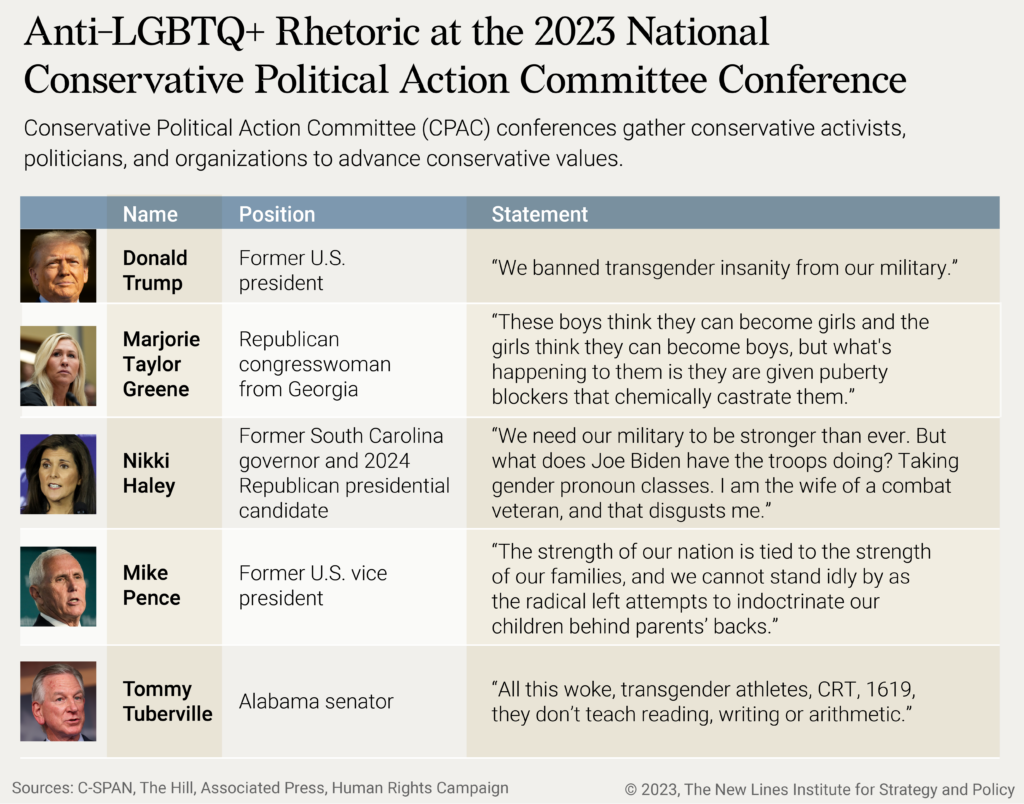
International outreach like CPAC’s has had major consequences around the globe, as seen with the abortion issue. In the U.S., restrictions on abortion access are growing while basic services for LGBTQ+ people are being curtailed. The movement within the U.S., however, has international implications. In 2020, the U.S. joined forces with Brazil, Egypt, Hungary, Indonesia, and Uganda to draft an anti-abortion pronouncement called the Geneva Consensus Declaration on Promoting Women’s Health and Strengthening the Family “in a rebuke of United Nations human rights bodies that have sought to protect abortion access.” More than 30 countries have signed the declaration, which reaffirms that there is no “international right to abortion” and that the U.N. must respect national sovereignty when it comes to issues of abortion and family planning.
Whether espoused by grassroots organizers, professional organizations, or political elites, the strategy is the same: to create political polarization by inciting fear and anxiety regarding marginalized groups and to offer solutions grounded in punitive practice. Not only does this approach drum up a political voting base by claiming to represent and protect “the people,” but it also opens the way for illiberal politicians to gain access to democratic systems and begin to chip away at them from within.
Attacks on LGBTQ+ Rights
A well-known populist strategy is to exploit existing divisions in society and mobilize supporters around alternative notions of national identity that are rooted in exclusion and antagonism. The list of imagined enemies often includes the most marginalized, such as undocumented migrants, communities of color, and LGBTQ+ individuals, thereby pushing subaltern groups into realms of greater insecurity.
Cultural and legal norms that promote gender and sexual equality, for example, are often represented as running counter to traditional religious and conservative ideologies, thus making them an easy target for illiberal governments. Populist presidents – like Brazil’s Bolsonaro, Andrzej Duda of Poland, and most recently Recep Tayyip Erdoğan of Turkey – ascended to power by campaigning around anti-LGBTQ+ agendas and turned campaign rhetoric into action. Under Duda’s leadership, by 2020, nearly one-third of the country’s towns and regions had declared themselves “LGBT Free Zones” and unwelcoming of “LGBT ideology.” Meanwhile, Turkey has banned pride marches and shut down LGBTQ+ student groups. During his term, Bolsonaro – a self-proclaimed “proud homophobe” – passed legislation restricting gay men from being able to donate blood, banned “gender ideology” from being taught in schools, and removed discussion of sexuality from Brazil’s Ministry of Human Rights.
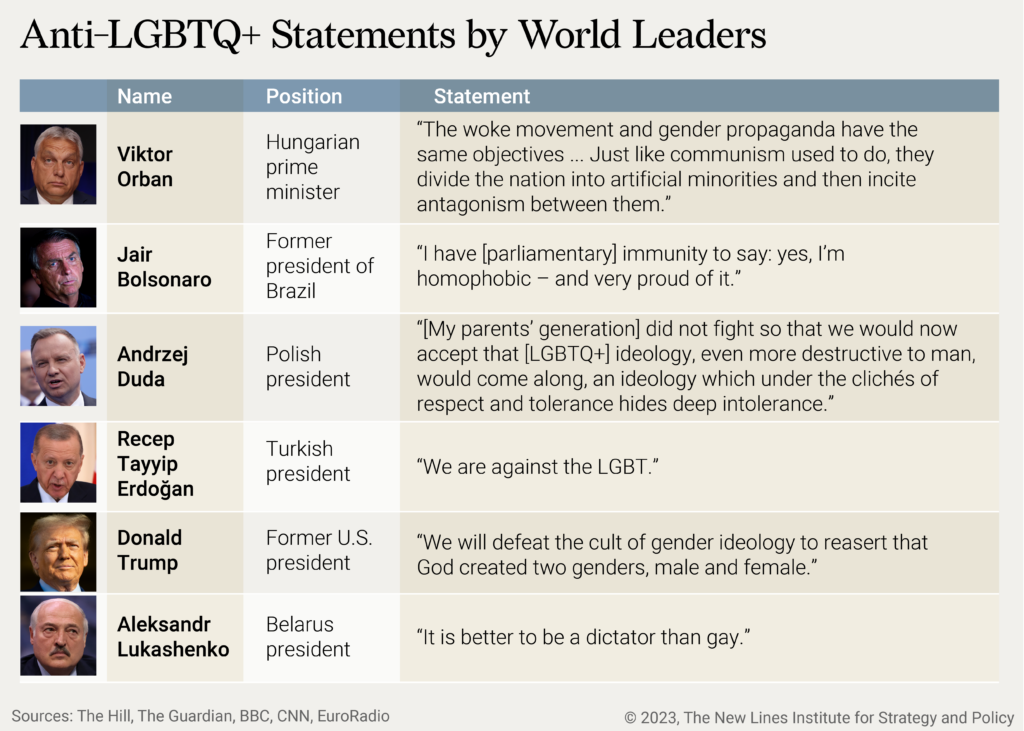
As the United States enters its own presidential election cycle, far-right candidates are following suit. Front-runners Donald Trump and Ron DeSantis have vowed to clamp down on LGBTQ+ rights and promote values centered on the traditional nuclear family. Trump has stated that he would not only ban gender-affirming care for minors, but he would also prohibit any federal tax dollars from being used for gender-affirming care practices for all, regardless of age. DeSantis, meanwhile, has criticized Trump for being “a pioneer” in support of rights for LGBTQ+ people and has ardently defended his anti-LGBTQ+ positions.
Both DeSantis and Trump have shown that they back their words with action. While president, Trump banned transgender individuals from serving in the military, rolled back non-discrimination protections for LGBTQ+ workers, and eliminated guidance that helped schools navigate equal treatment of transgender students, among numerous other initiatives. As governor of Florida, a slew of anti-LGBTQ+ and anti-trans bills, including but not limited to banning gender-affirming care for minors, preventing education on sexuality and gender identity in schools, and criminalizing trans individuals for using restrooms that do not match their gender identity.
Hate speech and misinformation campaigns against LGBTQ+ people in the U.S. have also surged in the last decade and have mobilized people along anti-gender lines. According to a 2022 report issued by the Human Rights Campaign and the Center for Countering Digital Hate, “grooming” rhetoric on social media sites increased by more than 400% in the months following the passage of Florida’s “Don’t Stay Gay or Trans” bill.
Yet the attack on LGBTQ+ – specifically transgender – people, in the U.S. does not come from the far right alone, as more moderate Republicans have also begun campaigning on anti-LGBTQ+ promises. In 2022, Sen. Tim Scott introduced legislation that sought to withhold federal funding from schools that offered support for transgender students without getting prior parental consent. In June 2023, former U.N. Ambassador and governor of South Carolina Nikki Haley erroneously connected rising suicide ideations among teenage girls including transgender athletes in women’s sports. More recently, in the second Republican presidential primary debate in September 2023, Mike Pence vowed to ban gender-affirming care for both children and adults.
Victor Madrigal-Borloz, the U.N. Independent Expert on sexual orientation and gender identity, has publicly stated that such “narratives of exclusion” – especially those promoting discrimination against LGBTQ+ individuals – are a fundamental threat to basic human rights and the principles of “freedom, self-determination, privacy, and dignity.” These narratives are often promoted under the guise of protecting the nation, the nuclear family, and traditional values, and the vulnerable people in these stories are characterized as an imminent danger to women and our children. This is particularly true for trans individuals, who are perhaps the most socially and politically vulnerable to discrimination, violence, and threats to bodily integrity.
In a 2021 U.N. report submitted to the Human Rights Council, Madrigal-Borloz wrote, “The impact of these narratives in public policy is already taxing trans communities around the world, and the number of extraordinary, unjustified and arbitrary legal measures either adopted or under discussion in different confines in the world, which seek to limit or exclude access to social integration by trans women and girls, trans men and boys, and gender-diverse persons, are of great concern.” Madrigal-Borloz notes that it is the state’s responsibility not only to protect its people from such discrimination but that it also must acknowledge “the stereotypes, power asymmetries, inequality and fundamental violence” within the state itself that enable these issues to arise in the first place.
LGBTQ+ Rights and Domesticating the Women, Peace, and Security Agenda
As demonstrated above, populist and illiberal onslaughts on LGBTQ+ communities are as prevalent in the U.S. as they are abroad. Such attacks are not only a threat to democratic stability but also are fundamentally about human rights and human security. Taken together, far-right groups and anti-LGBTQ+ discourses provide fertile ground for hate groups to mobilize and go on the offensive. Therefore, taking LGBTQ+ rights seriously also entails creating adequate space for LGBTQ+ rights and protections in matters of domestic security. This is especially important when it comes to the rights of lesbian, bisexual, transgender, and queer women who are meant to be supported by the WPS agenda.
In 2022, the Armed Conflict Location & Event Data Project (ACLED) reported that far-right “militias and militant social movements like the Proud Boys and Patriot Front have increased their engagement in anti-diversity demonstrations by over three times this year, from 16 events in 2021 to 52 events as of mid-November 2022,” adding that this “is a dangerous trend: demonstrations are over four times more likely to turn violent and/or destructive when far-right militias or militant social movements are involved.” In August last year, Madrigal-Borloz advised the Biden administration to “redouble its efforts to support the human rights of all LGBTQ+ persons living under its jurisdiction, and helping them to safe waters” given the continuing erosion of LGBTQ+ rights by some state governments within the U.S.
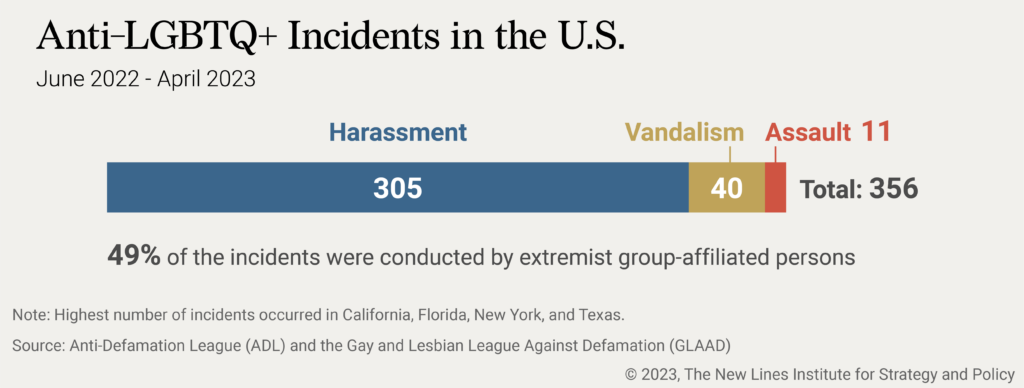
In early 2023, the Department of Homeland Security (DHS) acknowledged that LGBTQ+ Americans – especially transgender women and women and girls of color – are experiencing a surge of violent attacks. Moreover, such attacks are often linked to hate groups and domestic violent extremists. In June of 2023, with the support of the Department of Justice (DOJ) and the Department of Health and Human Services (HHS), DHS established the LGBTQ+ Community Safety Partnership, which seeks to work in partnership with LGBTQ+ community organizations to bring greater levels of safety to those under threat. The Southern Poverty Law Center is also tracking funding for anti-LGBTQ+ hate groups and the millions of dollars raised by politicians under the banner of mainstreaming this anti- and extremism. The Southern Policy Law Center finds, “A central theme of anti-LGBTQ+ organizing and ideology is the opposition to LGBTQ+ rights or support of homophobia, heterosexism and/or cisnormativity often expressed through demonizing rhetoric and grounded in harmful pseudoscience that portrays LGBTQ+ people as threats to children, society and often public health.”
The new U.S. WPS Strategy and NAP offers several meaningful entry points for research and programming to respond to the challenges outlined here. One especially pertinent opportunity is The Global Partnership for Action on Gender-Based Online Harassment and Abuse (Global Program). All three of its strategic objectives – to develop and advance shared principles, to increase targeted programming and resources, and to expand reliable, comparable data and access to it – should also be inclusive of LGBTQ+ communities specifically. A related point of entry for working with LGBTQ+ organizations is the stated interest in addressing “the nexus between online misogyny and domestic terrorism.” Achieving this requires partnerships with women’s and LGBTQ+ organizations most familiar with the shape this violence takes as experts to research and inform meaningful responses.
Yet showing how hate groups mobilize against LGBTQ+ individuals is necessary to understand the full spectrum of gender-based violence. Therefore, as the Biden-Harris administration implements the U.S. WPS Strategy and NAP it should conduct an inward examination of hate crimes against women, including lesbian, bisexual, transgender, and queer women, as well as LGBTQ+ communities as a matter of domestic security. This work can also contribute to ongoing efforts by groups like the ACLU to track anti-LGBTQ legislation across the U.S. The need for investing in partnerships committed to coalitional movement building between groups being targeted during this populist moment will only become more pressing amid upcoming elections, where extremism against LGBTQ+ people will be a central issue to mobilize American voters.
Policy Recommendations
To move this work forward, policymakers should consider these recommendations:
- Fund LGBTQ+ experts to inform and lead U.S. WPS Strategy and NAP implementation.
- Develop and fund adequate reporting on the domestic connections between populist and illiberal politics, anti-gender and anti-LGBTQ+ violence, and security as a dimension of programming targeting technology-facilitated gender-based violence. This should include working with Jessica Stern, the current U.S. Special Envoy to Advance the Human Rights of Lesbian, Gay, Bisexual, Transgender, Queer and Intersex Persons.
- Fund partnerships with a diverse consortium of domestic women’s and LGBTQ+ civil society organizations, prioritizing lesbian, bisexual, transgender, and queer women, to guide specific actions for how to better integrate sexual orientation and gender identity within existing gender, peace, and security initiatives more broadly. (See “Queering Women, Peace and Security: A practice-based toolkit” for recommendations and best practices.)
- Commit to working with the U.N.’s Sexual Orientation and Gender Identity International Expert Mr. Graeme Reid on a report about the anti-gender and anti-LGBTQ+ movements at home and abroad expanding on how this is a dimension of the WPS agenda. This funding should include money for documentation and data collection about best practices in improving engagement with lesbian, bisexual, transgender and queer women.
- Fund a dedicated report that audits previous WPS efforts for engagement with LGBTQ+ organizations and informs best ways forward for supporting opportunities for partnerships between LGBTQ+ organizations and WPS organizations.
Dr. Elizabeth Corredor, Ph.D., is a Visiting Assistant Professor of Political Science at Bryn Mawr College. Her teaching and research center on the inclusion of women’s and LGBTQ+ rights in peace and security, specifically focusing on the Americas. Her book manuscript “Gender Justice, Resistance, and the Politics of Peace in Colombia” examines the 2010-2016 Colombian peace negotiations to unearth how women’s and LGBTIQ+ groups’ agendas were accepted, co-opted, and/or resisted within the negotiations and final agreement. Dr. Corredor is the recipient of the 2022 American Political Science Association’s Best Dissertation Award in Women, Gender, and Politics.
Dr. Jamie J. Hagen is a Lecturer in International Relations at Queen’s University Belfast where she is founding co-director of the Centre for Gender in Politics. Her work sits at the intersection of gender, security studies and queer theory. She is lead researcher on a British Academy Innovation Fellowship (2022-2023) focusing on improving engagement with lesbian, bisexual, transgender, and queer women in Women, Peace and Security Programming. She is co-editor of the forthcoming edited volume “Queer Conflict Research: New Approaches to the Study of Political Violence” (BUP).
The views expressed in this article are those of the author and not an official policy or position of the New Lines Institute.

